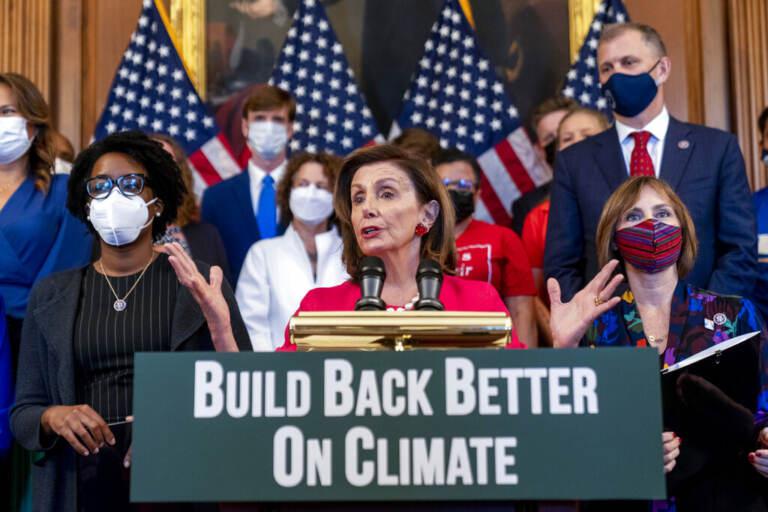BOSTON — Senate Democrats pushed through a massive climate change bill late Thursday, brushing aside objections that a provision of the measure allowing local bans on natural gas hookups would cost jobs and worsen the housing crisis.
The $250 million Democratic-led proposal was approved in a 37-3 vote down party lines after a daylong debate and ill-fated attempt by the Senate's Republican minority to pass a $500 million "alternative" plan.
In remarks ahead of the vote, state Sen. Mike Barrett, D-Lexington, co-chair of the Committee on Telecommunications, Utilities and Energy and the bill's primary architect, acknowledged that the proposal includes "tough decisions" to reduce the state's greenhouse gas emissions and avoid the impacts of climate change.
"We've reduced our options as a world in dealing with climate change, and we all know that our choices are narrower and more difficult," Barrett said.
The bill focuses on three areas — expanding wind, solar power and other clean energy; reducing emissions from buildings by restricting new fossil fuel heating and cooling systems; and cutting tailpipe emissions by providing more incentives for consumers to purchase electric vehicles and expanding charging stations.
The plan, which would be funded with surplus state revenue, also calls for setting up a $100 million clean energy investment fund to help foster the development of cutting-edge clean technologies such as geothermal energy and nuclear fusion.
Sales of new internal combustion vehicles would be banned beginning in 2035. The plan would also require the MBTA to electrify its bus fleet by 2040.
But a key provision of the bill would authorize at least 10 communities to implement local "pilot project" bans on natural gas hookups in new homes and other buildings.
Several communities – including Brookline, Lexington, Concord and Arlington – sought to ban new gas hookups but have been prevented by state law.
The plan is opposed by contractors, real estate developers and others who say banning gas hookups would drive up construction costs and hamper economic development, while doing little to advance the goal of decarbonization.

Critics also say municipal gas bans are not necessary because the state Department of Energy Resources is finalizing new "stretch" building codes for communities aimed at helping them shift to cleaner sources of energy in new construction.
The Senate's Republican minority offered a "alternative" climate change bill, which it unveiled only hours before the debate Thursday. The proposal called for creating a climate change fund with $500 million in state surplus and federal pandemic relief funding.
Money from the new fund would be used to provide incentives to expand EV sales, install more charging stations, provide grants to local governments to purchase low emission vehicles, and update regulations to expand the use of solar power.
But the GOP plan noticeably did not include the proposal to allow local natural gas bans and other initiatives in the Democratic majority's bill.
During debate on the bill, Senate Minority Leader Bruce Tarr, R-Gloucester, said the Senate's GOP minority supports decarbonization efforts but wants to make sure the move does not saddle energy consumers with higher bills or cut off vital sources of energy before there is cleaner power available to fill the baseload.
"We need to be mindful of the realities ... of impacts on those who pay the bills, the realities of needed supplies of energy that have to be identified – much less come into existence – and the realities that we need a reliable grid," Tarr said.
Ultimately, Democrats voted along party lines to defeat the GOP's amendment, and Tarr and the Senate's two other Republicans voted against the final bill.
Debate on the bill stretched much of the day as lawmakers slogged through more than 150 amendments – a record number for a nonbudget spending bill. At least 45 amendments were adopted, but the majority were rejected or withdrawn before coming up for a vote.
Passage of the measure comes a year after Gov. Charlie Baker signed another major climate change bill that requires the state to meet ambitious benchmarks to reduce greenhouse gas emissions to "net zero" over 1990s levels by 2050.
To do that, the plan calls for tougher efficiency standards for appliances, development of offshore wind and expanded solar energy use, as well as new emissions limits on electric power, transportation, heating and cooling, and other sectors of the economy.
"Last year was about laying out a road map," Barrett said in remarks ahead of the vote Thursday. "Today, we start traveling down the road."
The measure now moves to the state House of Representatives, which must take it up before the end of formal sessions July 31.
Christian M. Wade covers the Massachusetts Statehouse for North of Boston Media Group’s newspapers and websites. Email him at cwade@northofboston.com.




